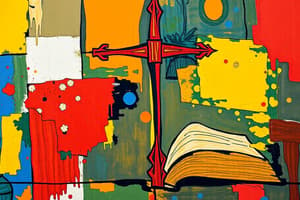Podcast
Questions and Answers
Which areas of Italian law does Diritto ecclesiastico commonly intersect with?
Which areas of Italian law does Diritto ecclesiastico commonly intersect with?
- Environmental law and tax law
- Administrative law and civil law (correct)
- Criminal law and labor law
- International law and corporate law
What factor has influenced the evolution of the legal framework surrounding Diritto ecclesiastico?
What factor has influenced the evolution of the legal framework surrounding Diritto ecclesiastico?
- Historical context and political dynamics (correct)
- Globalization and trade agreements
- Commercial interests of the state
- Technological advancements
What do modern legal frameworks related to Diritto ecclesiastico aim to balance?
What do modern legal frameworks related to Diritto ecclesiastico aim to balance?
- Tradition and innovation
- Profit and liability
- Legal protection and the rights of religious communities (correct)
- Public opinion and state mandates
Which principle is often relied upon in legal proceedings addressing issues within Diritto ecclesiastico?
Which principle is often relied upon in legal proceedings addressing issues within Diritto ecclesiastico?
What has significantly impacted current practices within Diritto ecclesiastico?
What has significantly impacted current practices within Diritto ecclesiastico?
What does Diritto ecclesiastico primarily regulate?
What does Diritto ecclesiastico primarily regulate?
What is one criterion for granting legal standing to religious organizations in Italy?
What is one criterion for granting legal standing to religious organizations in Italy?
Which rights are protected under the Italian Constitution's guarantee of religious freedom?
Which rights are protected under the Italian Constitution's guarantee of religious freedom?
What aspects of religious activities does Diritto ecclesiastico regulate?
What aspects of religious activities does Diritto ecclesiastico regulate?
How does the state regulate the establishment of places of worship?
How does the state regulate the establishment of places of worship?
What financial interactions are regulated by Diritto ecclesiastico?
What financial interactions are regulated by Diritto ecclesiastico?
What limitation does the Italian law impose on religious freedom?
What limitation does the Italian law impose on religious freedom?
What does the regulation of religious phenomena include?
What does the regulation of religious phenomena include?
Flashcards
Diritto Ecclesiastico
Diritto Ecclesiastico
The study of legal relationships between the state and religious institutions in Italy, particularly the Catholic Church.
Intersection with other Legal Fields
Intersection with other Legal Fields
Diritto Ecclesiastico involves principles from other areas of law, like administrative or civil law, to resolve conflicts or clarify shared jurisdiction.
Evolution of Diritto Ecclesiastico
Evolution of Diritto Ecclesiastico
The legal relationship between the state and the Catholic Church in Italy has evolved over time, reflecting changing political and social contexts.
Balance of State Interests and Religious Rights
Balance of State Interests and Religious Rights
Signup and view all the flashcards
Impact of Legislation and Judicial Interpretation
Impact of Legislation and Judicial Interpretation
Signup and view all the flashcards
What is Diritto Ecclesiastico?
What is Diritto Ecclesiastico?
Signup and view all the flashcards
Legal Status of Religious Organizations in Italy
Legal Status of Religious Organizations in Italy
Signup and view all the flashcards
What is Religious Freedom in Italy?
What is Religious Freedom in Italy?
Signup and view all the flashcards
How does Diritto Ecclesiastico regulate Religion?
How does Diritto Ecclesiastico regulate Religion?
Signup and view all the flashcards
What are the Regulations for Places of Worship?
What are the Regulations for Places of Worship?
Signup and view all the flashcards
How are Financial Relations Regulated?
How are Financial Relations Regulated?
Signup and view all the flashcards
What's the Importance of Diritto Ecclesiastico?
What's the Importance of Diritto Ecclesiastico?
Signup and view all the flashcards
How is Diritto Ecclesiastico different from Canon Law?
How is Diritto Ecclesiastico different from Canon Law?
Signup and view all the flashcards
Study Notes
Introduction to Diritto Ecclesiastico
- Diritto ecclesiastico is the branch of Italian law that concerns itself with the relationship between the Italian state and the Catholic Church.
- It encompasses various aspects, including the legal status of religious organizations, the regulation of religious phenomena, and the governance of religious freedom.
- This field of law is distinct from canon law (the internal law governing the Catholic Church).
- It regulates matters that intersect civil and religious spheres.
Legal Status of Religious Organizations
- The Italian legal system recognizes various religious organizations beyond the Catholic Church.
- Recognition can range from "full" legal personality to less formalized forms of recognition for smaller religious groups.
- Criteria for granting legal standing include membership, established presence, and compliance with Italian legal standards.
- Recognized religious organizations often receive privileges, such as tax exemptions, or have rights to establish places of worship or religious institutions.
Religious Freedom
- The Italian Constitution safeguards the right to religious freedom.
- This encompasses freedom of conscience, belief, worship, and religious practice.
- This protection extends to all individuals and organizations, regardless of faith or lack thereof.
- Limitations on religious freedom exist, but they are tailored to protect public order and prevent actions that violate fundamental rights of others.
Regulation of Religious Phenomena
- Diritto ecclesiastico regulates various aspects of religious activities.
- This includes issues like religious education in schools, observance of religious holidays, and the management of religious assets.
- Religious symbols and their display are subject to potential legal considerations in public spaces.
Aspects of Public Worship
- Regulations encompass the establishment of places of worship.
- Legal issues related to the use and management of religious buildings are addressed.
- Restrictions may be in place concerning the construction of new places of worship in urban areas.
Financial and Economic Aspects
- Financial interactions between the state and religious organizations are regulated.
- This includes tax benefits, financial support for certain religious activities, and the separation of state aid from religious institutions.
- Specific rules exist for the financial reporting and administration of religious organizations.
Intersection with other Legal Fields
- The scope of Diritto ecclesiastico often intersects with other areas of Italian law, such as administrative law and civil law.
- Conflicts and shared jurisdictions might necessitate interplay with other areas for resolution.
- Specific legal proceedings that address issues within this field may rely on principles from other areas of law.
Evolution of Diritto Ecclesiastico
- The legal framework surrounding the relationship between the state and the Catholic Church has evolved.
- Early developments in this area frequently reflected the historical context and political dynamics of the time.
- Modern legal frameworks strive for a balance between legal protection and the rights of religious communities.
- Legislative changes and judicial interpretations have significantly shaped and continue to influence current practices.
Studying That Suits You
Use AI to generate personalized quizzes and flashcards to suit your learning preferences.



